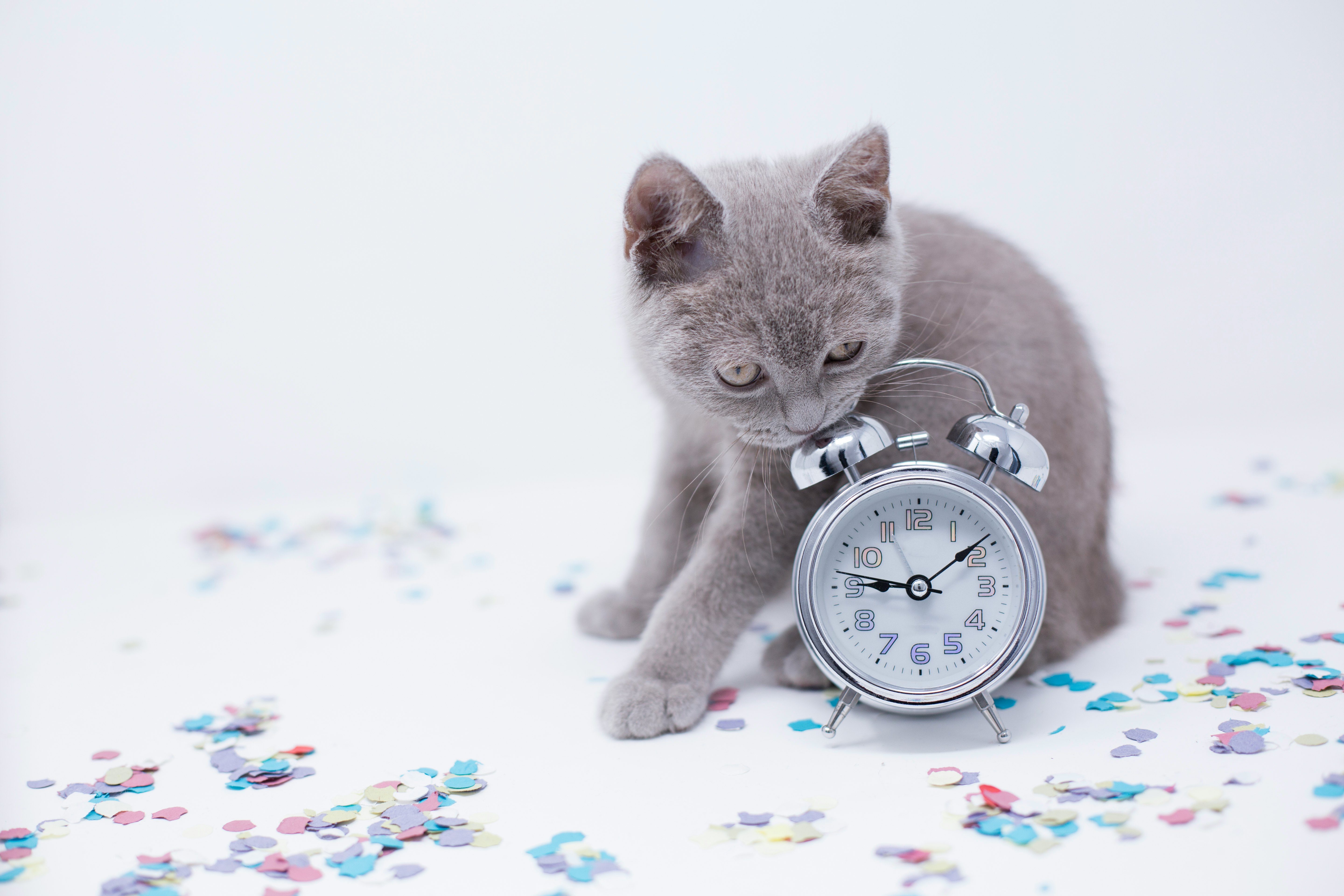
If you’re a cat owner, you probably don’t need an alarm clock to wake you up in the morning, because your feline will promptly rouse you from your slumber right before your alarm is supposed to go off, begging for its expectant meal.
Or maybe you’ve experienced your pet sitting by the window waiting for your return at 5 p.m. sharp, or tugging at your jeans right when you’re supposed to serve her dinner. All of these instances have one theme in common: time.
It’s only natural to wonder: Can your cat perceive time in the same way a human can? Experts are divided on this question because it really depends on how you define time. Let’s explain.
“Cats can tell time, but not in the same way humans do. They don’t know it’s five o’clock, but they are keenly aware of rhythm,” Molly DeVoss, a certified feline training specialist who runs the nonprofit Cat Behavior Solutions, tells Inverse.
Does My Cat Have a Sense of Time?
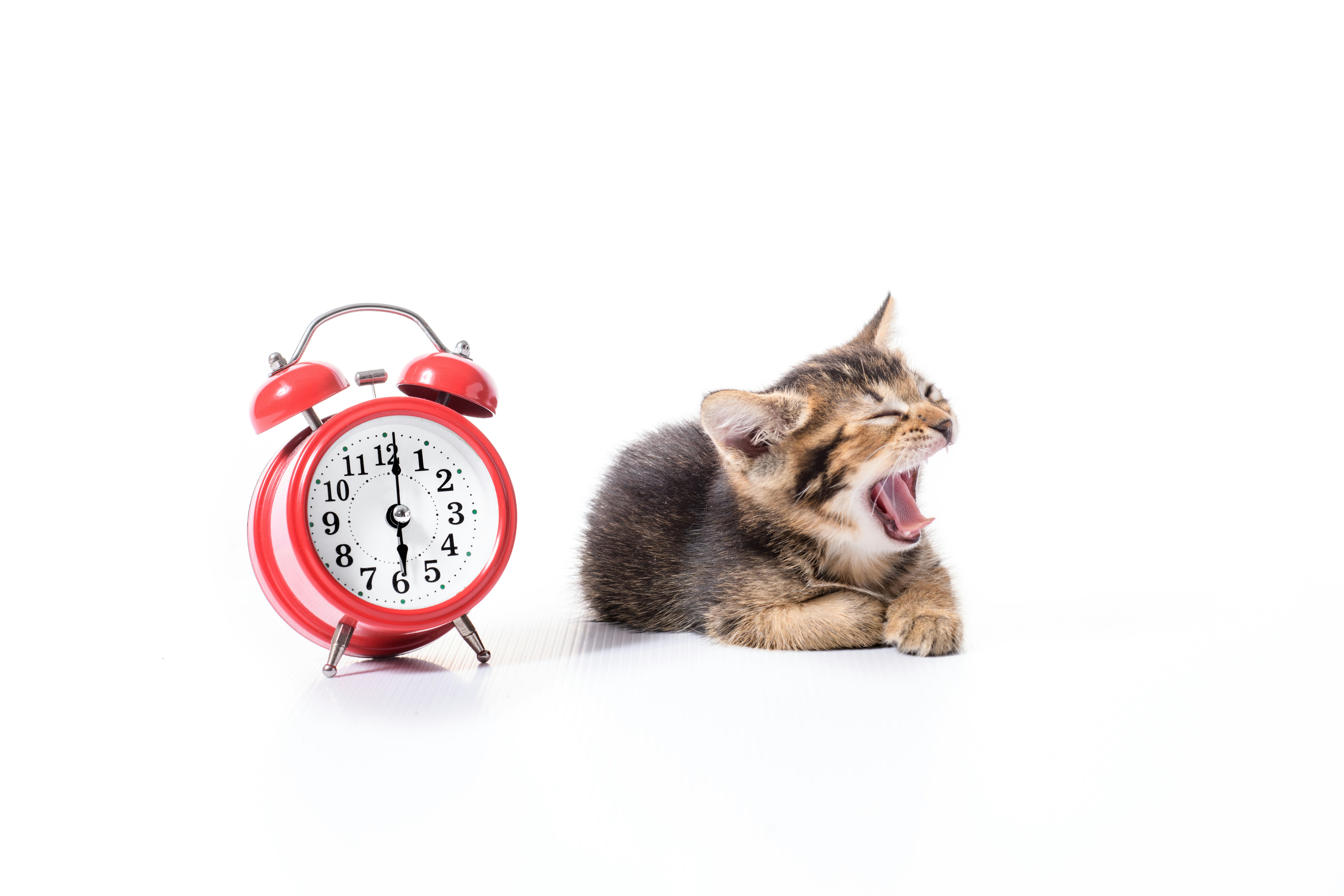
It’s difficult to answer this question, since there is very little research on cat cognition — let alone feline time perception. So we have to draw upon other animal cognition models.
“It’s not apparent that much research has been done on cats’ perception of time,” Liz Stelow, a veterinary behaviorist at the University of California, Davis, tells Inverse. Stelow says cats draw upon environmental cues like the sound of the car in the driveway or kids walking home from school as a signal to wait by the window for their owner’s return — but that in itself isn’t a confirmation that cats have a sense of time.
But experts say cats probably — like most other mammals — have a general sense of the passage of time.
“As far as we know, cats may not have an exact, down to the second, same sense of time, but they do have several different rhythms that may help them appreciate the passage of time,” Katherine Pankratz, a board-certified veterinary behaviorist, tells Inverse.
Animal cognition experts say most mammals can roughly measure an “elapsed interval of time” like being able to tell when time has passed since an event.
“The idea that an animal can tell when I've been gone for five minutes versus five hours, right? That's not really in dispute,” Jonathon D. Crystal, Provost Professor of Psychological and Brain Sciences at Indiana University, tells Inverse.
Can Cats Tell Time As Well As Humans?
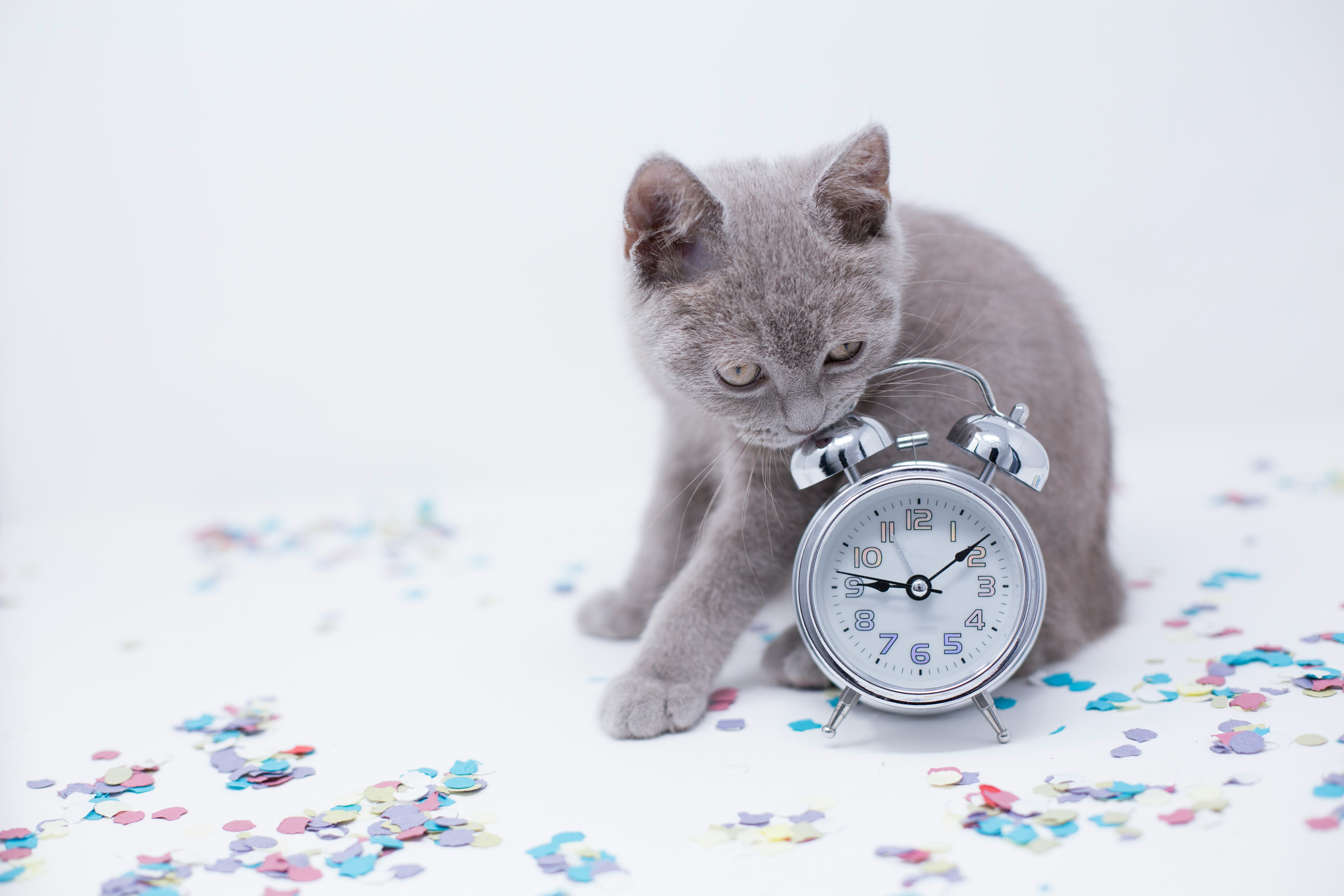
But can cats tell time as precisely as humans? That’s a trickier question to answer. There are a few different ways to approach this question.
The first way: determine whether cats have better or worse “temporal perception” based on how fast they see the world, i.e., in frames per second (yes, like a camera’s frame rate). Inverse consulted Kevin Healy, a zoology researcher at the University of Galway, to discuss whether cats perceive time better or worse than humans based on his prior research. Smaller animals and predators tend to have faster time perception, but that’s not the case with cats.
“We can see time a little faster than cats who have a frame rate of 55 compared to our 65,” Healy says.
The second way to answer whether cats can tell time as well as humans has to do with whether cats have episodic memories, which are memories of specific events in time. The ability to form episodic memories may be central to what cognition researchers call “mental time travel” — the ability to mentally project forward and backward into time. It’s long been thought humans are alone in our ability to mentally time travel, but that might not be the case after all.
“...we cannot say that animals understand time the same as humans”
Daniel Dombeck is an associate professor in Northwestern University’s department of neurobiology who has researched time perception in mice. He says it’s “unlikely” humans have a unique gift for mental time travel, though it’s probable humans can remember farther back in time and in greater detail than rodents.
“Rodents, for example, have representations of time in their brains, and neural activity patterns have been observed that suggest that they too can imagine different past or future events,” Dombeck tells Inverse, adding that “we cannot say that animals understand time the same as humans.”
To prove whether cats have episodic memories, you’d have to conduct tests that rule out other possible explanations — like a biological rhythm signaling it’s time to eat — for why a cat might appear to “remember” something, according to Crystal, which is difficult to accomplish.
“There's no there's no doubt that lots of animals have the content of episodic memories,” Crystal says, though he prefers the term “animal model of episodic memory.”
A 2017 study found that cats indeed contain “episodic-like” memories, but the lead researcher on that study, Saho Takagi, isn’t sure whether cats really need episodic memories for time perception.
“It is difficult with current technology to prove whether or not they do mental time travel, but at least my research has shown that cats form episodic-like memories,” Takagi says.
To conclude: the jury is still out on this question, pending further animal cognition research — and hopefully, cat-specific studies.
“Many studies have shown that animals can perceive time intervals, but I do not believe that this leads to animals having the same sense of time as humans,” Takagi adds.
Why Does My Cat Know Exactly When It’s Mealtime?
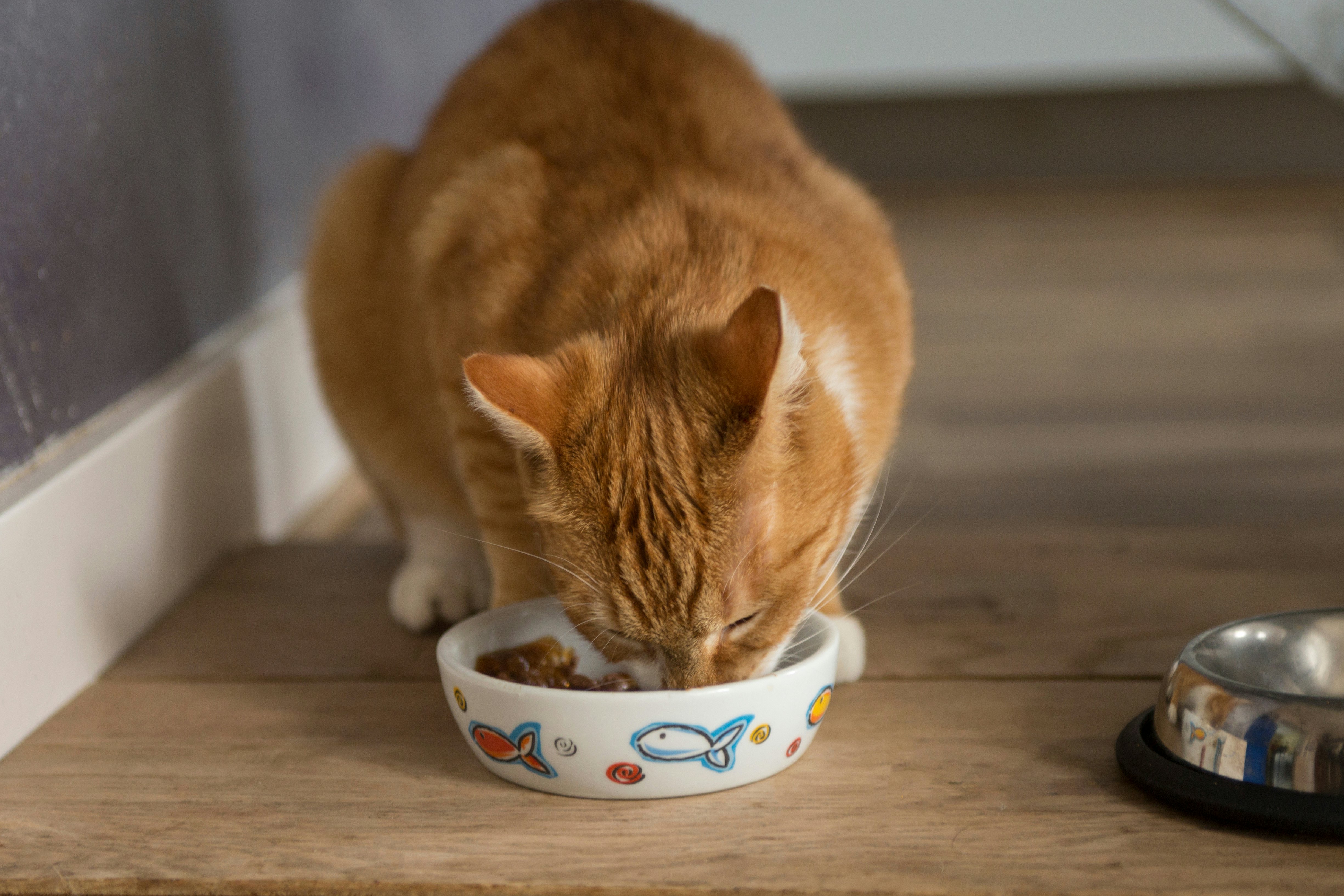
Two words can explain your cat’s alarmingly precise ability to detect when it’s dinnertime: biological clock.
“There are several ‘biological clocks’ that can assist with their ability to determine the passage of time,” Pankratz says.
The most well-known is the circadian rhythm or the “24-hour” cycle, which often corresponds to light and dark times of the day. Another mechanism is the “zeitberger” which sets the biological clock and causes jetlag and other phenomena in its absence. Examples of zeitbergers include drugs, the pineal gland, the presence of light, and atmospheric pressure.
These internal mechanisms and external cues from the environment — like their owner stirring in bed — can signal to your pet that it’s time to eat. Mikel Delgado, a cat expert at Feline Minds, lists some of the most common environmental signals that indicate breakfast time for cats:
- Changes in light and temperature
- The smell of coffee brewing
- Their human walking toward the kitchen
If your cat wakes you up for food early and you give into or reinforce that behavior, you may be unintentionally turning your cat into an “alarm pet” who expects meals like clockwork, Pankratz explains.
“Woe to the owner that makes the mistake of giving in even once. These cats benefit from automated feeders so that the owner is removed from the cat’s motivation to be fed,” Stelow says.
There’s also a more simple explanation: your cat is just hangry.
”In the wild, a cat will eat 10-20 small meals a day, so when we only feed them a couple times a day, they are hungry at that hour and are truly begging for food,” DeVoss says.
Does My Cat’s Biology Affect Its Sense of Time?
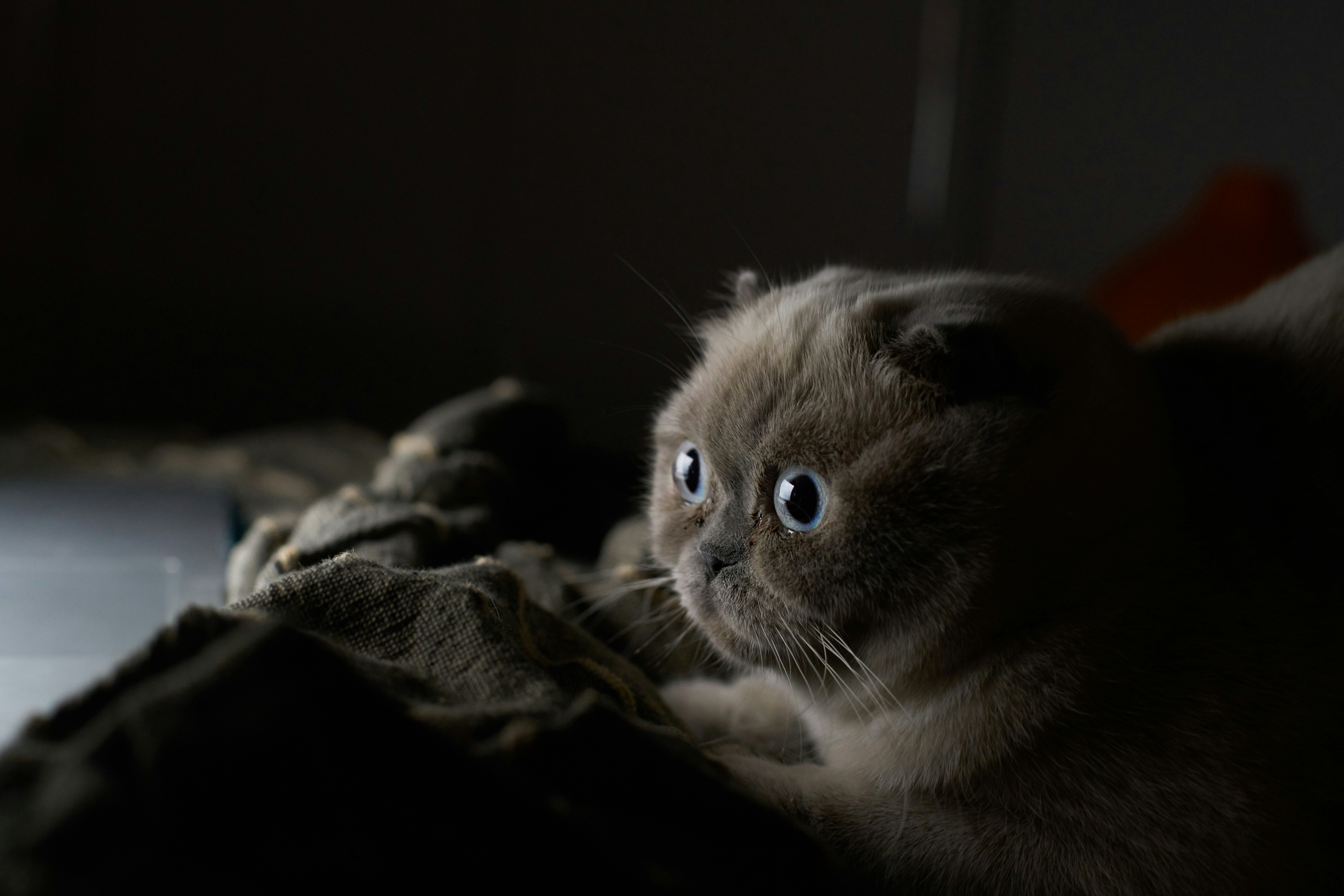
Cats differ from diurnal humans, who sleep at night and are awake during the day. But contrary to popular belief, they’re not technically nocturnal but crepuscular instead. Crepuscular beings are most active during dawn and dusk — before sunrise and after sunset — which might explain why your pet is getting the zoomies at 3 a.m
“Our crepuscular kitties may have greater activity levels near dusk and dawn, but it’s not clear that their concept of time changes based on the season or any external cues,” Stelow says.
Healy says cats’ nighttime activities basically require their retinas to have a longer “exposure time” — coming back to that camera analogy — to see in the dark, which leads to a lower “frame rate.” But he says that cats’ time perception is still pretty good compared to most nighttime-dwelling animals.
Yet other experts say this particular difference in cat and human biology shouldn’t drastically affect their perception of time. Both Stelow and Pankratz explain that human activity is more like to influence when cats are active versus their crepuscular biological clock.
“I don't think being crepuscular would change how cats are influenced by the sun. It just happens to be when their eyes are well-adjusted for seeing prey,” Delgado says.
How Can I Help My Cat Keep Track of Time?
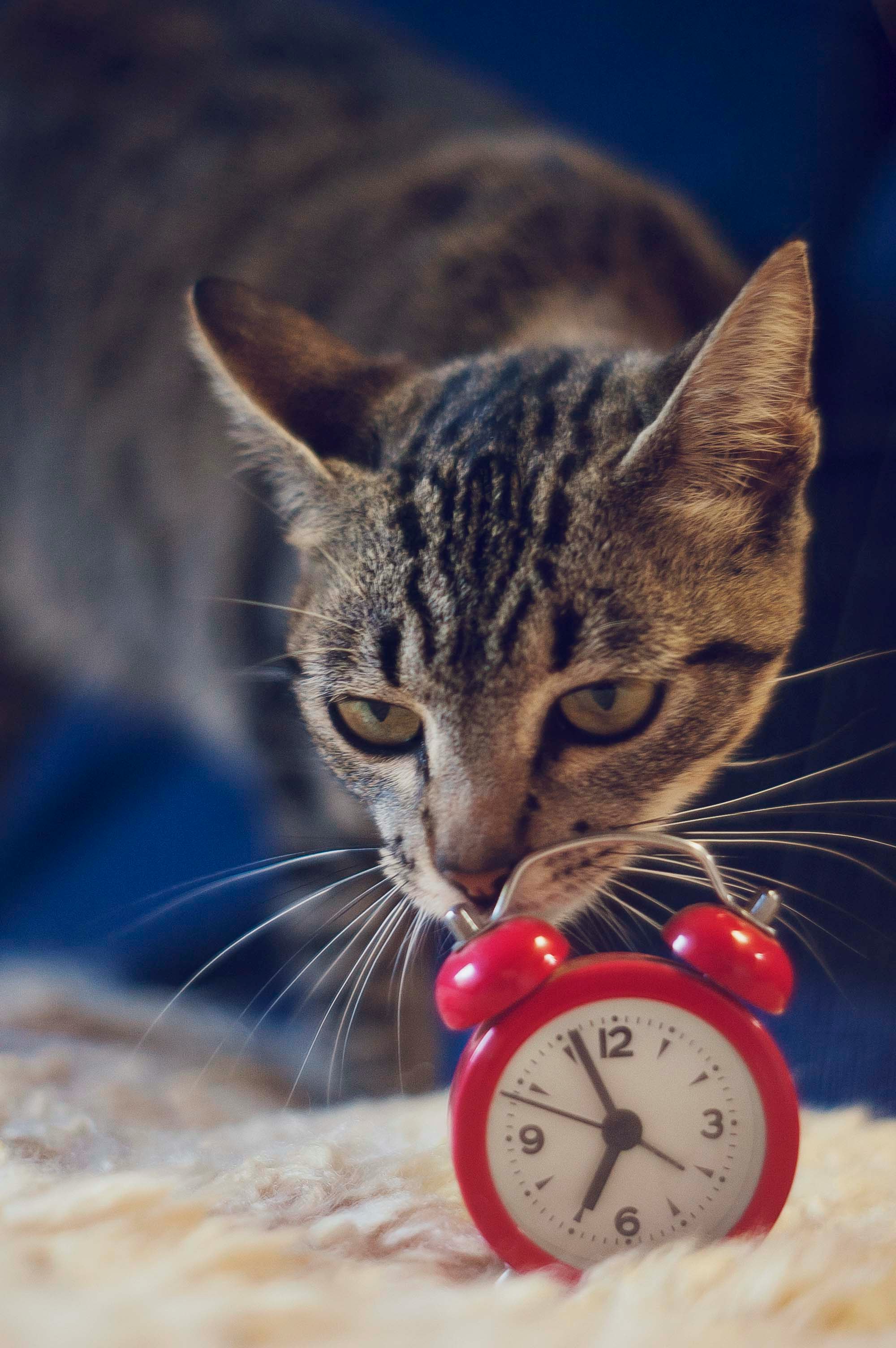
Experts have a few tips to offer to help your furry friend keep track of time in case they have separation anxiety when you head out for work or can’t stop bugging you for meals at the wrong time.
Above all else: make sure to keep to a set routine like meals and play at designated times as well as cleaning the litter box. Disrupting a cat’s daily routine can stress your kitty out, leading to physical ailments like vomiting and diarrhea, Delgado explains. Providing an automatic feeder that dispenses multiple small meals at specific times throughout the day can help establish a routine.
Pankratz explains that cats are “very attuned to changes in their environment” and form associations with certain activities at specific times.
“For example, a cat may learn the association that its owner’s arrival home means it is dinner time,” Pankratz says.
Experts suggest using signals to help your pet form associations with time-specific activities.
“Owners can have a specific routine that signals ‘We’re going out for the day’ and perhaps a different one for ‘We’re going to run an errand,” Stelow says.
Finally, if your kitty is showing signs of anxiety at your leaving the home, it’s a good idea to consult a veterinarian for further guidance.







